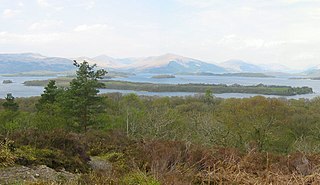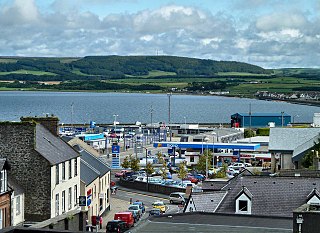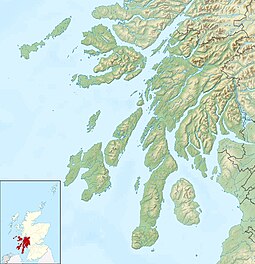
Loch Lomond is a freshwater Scottish loch which crosses the Highland Boundary Fault, often considered the boundary between the lowlands of Central Scotland and the Highlands. Traditionally forming part of the boundary between the counties of Stirlingshire and Dunbartonshire, Loch Lomond is split between the council areas of Stirling, Argyll and Bute and West Dunbartonshire. Its southern shores are about 23 kilometres (14 mi) northwest of the centre of Glasgow, Scotland's largest city. The Loch forms part of the Loch Lomond and The Trossachs National Park which was established in 2002.

Cowal is a peninsula in Argyll and Bute, in the west of Scotland, that extends into the Firth of Clyde.
Inchmurrin is an island in Loch Lomond in Scotland. It is the largest fresh water island in the British Isles.
Ardvreck Castle is a ruined castle dating to about 1490 when the lands were owned by the Macleods of Assynt. It stands on a rocky promontory jutting out into Loch Assynt in Sutherland, Scotland. One can reach the ruins by driving along the A837, which follows the north shore of Loch Assynt from the village of Inchnadamph.

Ardentinny is a small village on the western shore of Loch Long, 14 miles (23 km) north of Dunoon on the Cowal peninsula in Argyll and Bute, Scottish Highlands.

Culcreuch Castle is a Scottish castle close to the village of Fintry, near Loch Lomond. It had been the home of the Barons of Culcreuch since 1699. In the 1980s the castle was converted into a hotel, which it was run as until early 2020 when it was closed to the public.
Sorbie is a small village in Wigtownshire, Machars, within the Administration area of Dumfries and Galloway Council, Scotland.

Clan Galbraith is a Scottish clan. The clan does not have a chief recognised by the Lord Lyon King of Arms. Because of this, the clan is considered an armigerous clan, and as such Clan Galbraith has no standing under Scots Law. The clan-name of Galbraith is of Gaelic origin, however its meaning denotes the bearer as of British origin, as opposed to Gaelic. The early Galbraiths were centred in the Lennox district, which spans the Highland and Lowland border of Scotland. The 17th chief of the clan brought ruin to the clan in the late 16th and early 17th century, and eventually lost his lands and fled Scotland for Ireland. His grandson, the 19th chief, was the last chief of Clan Galbraith.

Inchcailloch is an islet on Loch Lomond in Scotland. It is 85 metres (279 ft) at its highest point. It is also known to some as Inchebroida.

Inchlonaig is an island in Loch Lomond in Scotland.
Inchtavannach, is one of the larger islands in Loch Lomond.

Ellanderroch is an island in Loch Lomond in Scotland.

Bucinch or Buc-Innis is a small island in Loch Lomond, in west central Scotland.

Eilean I Vow is a small island in Loch Lomond in west central Scotland. Other variants of the name include Ellan I Vow, Eilean a' Vow, Elanvow, Ellan Vhow and Island I Vow. The island is listed in 13th/14th century charters as "Elanvow".

Clairinsh or Clairinch is an island in Loch Lomond, central Scotland.

Fraoch Eilean is a small island in Loch Lomond, Scotland. Its name means "heather island" in Scottish Gaelic.

Inch is a civil parish in Dumfries and Galloway, southwest Scotland. It lies on the shore of Loch Ryan, in the traditional county of Wigtownshire.
Old Luce is a civil parish in Dumfries and Galloway, Scotland. It lies in the Machars peninsula, in the traditional county of Wigtownshire. The parish is around 10 miles (16 km) long and 8 miles (13 km) broad, and contains 40,350 acres (16,330 ha).

Inveruglas is a hamlet on the west shore of Loch Lomond, fairly near the north end of the loch and is within the Loch Lomond and The Trossachs National Park. It is situated on the A82 trunk road, connecting Glasgow to Inverness. It is within the historic county of Dunbartonshire, and since 1996 it has been part of the Argyll and Bute council area.













